|
|
|
Sort Order |
|
|
|
Items / Page
|
|
|
|
|
|
|
| Srl | Item |
| 1 |
ID:
171828
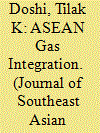

|
|
|
|
|
| Summary/Abstract |
In extant social science literature, there is a presumption that development is naturally associated with deepened regional economic integration. This, however, is an argument without foundation. In the case of natural gas in Southeast Asia, what has, in fact, occurred is a process of regional disintegration. Domestic supplies of natural gas in producing countries such as Myanmar, Malaysia and Indonesia are getting increasingly constrained, and pipeline supplies to neighbouring countries are expected to dwindle or cease altogether with supply contracts not being renewed. Grand visions of the Trans-ASEAN Gas Pipeline (TAGP), the region’s most ambitious mega project, have been made redundant by technological developments, market evolution and policy preferences among key regional governments. The concept of liquefied natural gas (LNG) trading hubs, which has received significant attention in recent years, faces equally challenging hurdles. Developments in the past few years have made it apparent that the option to directly import LNG has become a preferred option among ASEAN member countries.
|
|
|
|
|
|
|
|
|
|
|
|
|
|
|
|
| 2 |
ID:
174962
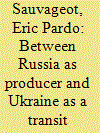

|
|
|
|
|
| Summary/Abstract |
Between 2014 and 2015, the EU started a new energy policy in order to address, among other issues, the problematic character of energy interdependence with Russia, and thus improve its energy security. The aim of this article is to determine how this policy considered interdependence with Russia in the light of diversification alternatives. Energy security is seen through short-term and long-term dimensions, which can be equated to the concepts of vulnerability and sensitivity interdependence. As the article shows, the alternative of LNG is limited by production and consumption patterns in both Europe and other world markets. It also shows that maintaining interdependence with Russia and reducing the role of transit countries such as Ukraine would yield benefits both in vulnerability and sensitivity interdependence. However, while the EU has strongly based its rhetoric on the promise of LNG, it has ignored alternatives that would maintain interdependence with Russia. Eventually, the EU's energy strategy has acknowledged the limitations of LNG, even though it has not changed its stance towards Russia. In that respect, it seems fair to conclude the EU has not rigorously analysed the transit dimension in its interdependence with Russia and the implications for its energy security.
|
|
|
|
|
|
|
|
|
|
|
|
|
|
|
|
| 3 |
ID:
091780
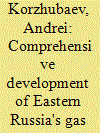

|
|
|
|
|
| Publication |
2009.
|
| Summary/Abstract |
The article describes in detail the gasfields of East Siberia and the Russian Far East. In analyzing the prospects for their development, the author compares different concepts and introduces the reader to the positions of academics from the Siberian Division of the Russian Academy of Sciences. The development of gas deposits for the gasification of the region and for export is deemed a prerequisite for solving the problems of eastern Russia's socio-economic development.
|
|
|
|
|
|
|
|
|
|
|
|
|
|
|
|
| 4 |
ID:
175005


|
|
|
|
|
| Summary/Abstract |
Natural gas, as the cleanest burning of the fossil fuels is expected to play a significant role in India's future energy mix. This paper presents a modelling approach to quantify the economic and environmental impacts of natural gas utilisation by various sectors in India while the production of domestically sourced natural gas is in decline. One of the most important sectors is the use of natural gas for cooking where the benefits are also evaluated. The long-term impacts of a reducing domestic gas supply is assessed by using the resource-substitution methodology along with a dynamic resource-depletion indicator that is based on decision-making viewpoints. The results show that the replacement of domestic gas with black coal resulted in an increase under the climate change category by 162%, 202% and 234% for the individualist, hierarchist and egalitarian viewpoints, respectively. The paper highlights the prospects for natural gas in India and shows that the growing demand for gas can be met through imports, but it has associated economic and environmental impacts. Further, the paper presents suitable recommendations including policy-related changes such as carbon pricing and subsidy provision schemes to ensure that the growth of the Indian gas market is sustainable.
|
|
|
|
|
|
|
|
|
|
|
|
|
|
|
|
| 5 |
ID:
107490


|
|
|
|
|
| Publication |
2011.
|
| Summary/Abstract |
An unceasing growth of gas consumption in domestic households, industry, and power plants has gradually turned natural gas into a major source of energy. Main drivers in this development are the technical and economic advantages of natural gas. It is a clean, versatile, and easily controllable fuel. On this basis, natural gas is often considered the form of energy that will be the "bridging fuel" to a sustainable energy system, sometime after 2050. Unlike other main sources of energy, such as oil and coal, gas is not traded on an actual world market. This paper provides an overview on demand and supplies of natural gas (LNG) in the past as a function of gas prices, gas technology (gas sweetening, liquefaction, shipping and re-gasification), and gas market and how they have changed recently. It also discusses the likely developments in global LNG demand for the period to the year 2030.
|
|
|
|
|
|
|
|
|
|
|
|
|
|
|
|
| 6 |
ID:
150349


|
|
|
|
|
| Summary/Abstract |
In the US, the shale gas revolution ensured that the development costs of unconventional natural gas plummeted to the levels of $2–3/Mcf. This success has motivated the development of shale gas in other regions, including Australia and Europe. This study, focussing primarily on aspects of economic impact analysis, estimates the development costs of shale gas extraction in both Australia and Europe, based on both direct and fiscal costs, and also suggests policy initiatives.
|
|
|
|
|
|
|
|
|
|
|
|
|
|
|
|
| 7 |
ID:
122811
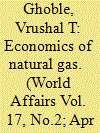

|
|
|
| 8 |
ID:
156324


|
|
|
|
|
| Summary/Abstract |
Armen Oganesyan, Editor-in-Chief, International Affairs: Yury Konstantinovich, in its short-term forecast for the energy market in May, the Energy Information Administration of the U.S. Department of Energy, comes to the conclusion that oil production will grow faster than demand and the oil market will be oversupplied in the foreseeable future. Is this forecast correct?
|
|
|
|
|
|
|
|
|
|
|
|
|
|
|
|
| 9 |
ID:
133156
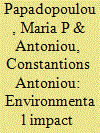

|
|
|
|
|
| Publication |
2014.
|
| Summary/Abstract |
The recent discovery of significant offshore natural gas reserves in the Aphrodite field, south of the island of Cyprus in the Mediterranean Sea, changes the energy landscape in the greater Mediterranean-Middle East-Caucasian Region. In this paper, different alternative locations for the construction and operation of a liquefied natural gas (LNG) terminal station in Cyprus were evaluated, explicitly considering also their connection to the power generation station of Mari and the country×s gateway.
The problem of determining the optimal location for an LNG terminal in Cyprus has been approached using multiple methodological components, which consider environmental and transportation issues, both technocratic in nature, as well as more subjective and based on expert opinion. The first step was a REGIME multi-criteria decision analysis used to prioritize alternative LNG terminal locations. Then, multiple modes (railroad and pipeline) of transportation connections were evaluated and geometric alignments were proposed, considering a multitude of restrictions. Finally an environmental impact assessment based on a structured questionnaire and an expert panel was conducted to validate and assess the impact of the alternative options (combination of location and transportation mode and route). During the evaluation process parameters such as safety, existing infrastructure, and access were also considered.
|
|
|
|
|
|
|
|
|
|
|
|
|
|
|
|
| 10 |
ID:
177442


|
|
|
|
|
| Summary/Abstract |
Interest in developing liquefied natural gas (LNG) has recently increased with global demand rising at a higher rate than any other fossil fuel in the last ten years. While the increase in demand for LNG has created an opportunity for countries with natural gas stocks, there is a significant amount of competition among these producing countries. As a result, jurisdictions have been implementing policies and subsidies to enhance their competitiveness in the global LNG market. We investigate the impact of this phenomenon in one gas-rich region, British Columbia, Canada, where the provincial government has promoted the development of a large-scale LNG industry. Drawing from staple theory, we explore how government policy has been shaped by the needs of the resource sector to provide incentives for expansion without undertaking comprehensive evaluation of the costs and benefits. As a result, the benefits of the expansion are overestimated, while the costs are underestimated. Our analysis shows that a more comprehensive and transparent evaluation of resource development policies is necessary to avoid suboptimal policies and ensure that development is in the public interest.
|
|
|
|
|
|
|
|
|
|
|
|
|
|
|
|
| 11 |
ID:
094875
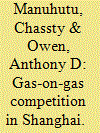

|
|
|
|
|
| Publication |
2010.
|
| Summary/Abstract |
In common with other major economic centres in China, Shanghai's energy consumption has been increasing rapidly to support the high growth rate of its economy. To achieve rational, efficient and clean use of energy, together with improved environmental quality within the city, the Shanghai municipal government has decided to expand the supply and utilization of natural gas. Shanghai plans to increase the share of natural gas in its primary energy mix to 7 per cent by 2010, up from 3 per cent in 2005. This increase in natural gas demand has to be matched with a corresponding increase in supply. To date, the Shanghai region has relied on offshore extracted natural gas but this supply is limited due to the size of the reserves. Since 2005, the West-East pipeline has provided an alternative for Shanghai but demands from other regions could reduce the potential for expanding supplies from that source. Since domestic production will not be sufficient to meet demand in the near future, Shanghai is building a liquefied natural gas (LNG) regasification terminal at the Yangshan deep-water port that would allow an additional supply of more than 3 billion cubic meters per year of natural gas. Malaysia has already committed to supply LNG to the Shanghai terminal at a price that is significantly higher than the wholesale "city-gate" price for natural gas transported via pipeline, but still lower than the gas price to end-use consumers. The presence of both an LNG terminal and a transmission pipeline that connects Shanghai to domestic gas-producing regions will create gas-on-gas competition. This study assesses the benefits of introducing such competition to one of China's most advanced cities under various scenarios for demand growth. In this paper, the impact of imported LNG on market concentration in Shanghai's gas market will be analysed using the Herfindahl-Hirschmann index (HHI) and the residual supply index (RSI). Our results show that Shanghai remains a supply-constrained gas market that will continue to rely upon gas supplies from the western provinces and imported LNG. After 2017, the gas market in Shanghai can be regarded as unconcentrated since its HHI fall below 1800 under a very high growth scenario. In terms of RSI, the gas market can be considered competitive at low, moderate and high growth consumption between 2012 and 2015.
|
|
|
|
|
|
|
|
|
|
|
|
|
|
|
|
| 12 |
ID:
139348
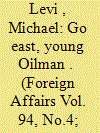

|
|
|
|
|
| Summary/Abstract |
Most observers agree that the United States, propelled by its boom in oil and gas production, is becoming increasingly central to global energy. As oil prices have plummeted, American oil producers have taken credit. As U.S. imports have fallen, foreign policy thinkers have suggested that Washington could rely far less on the Middle East. As U.S. firms have prepared to export liquefied natural gas (LNG), market watchers have braced for a transformation of global natural gas markets and, as a result, geopolitics. And as U.S. energy companies have begun to capitalize on shale gas and renewable energy to tame their reliance on coal, scientists have hoped that Washington might finally take the lead in combating climate change. But when future historians reflect on the ongoing transformation of the global energy landscape, they won’t focus narrowly on the United States: Asia will feature at least as prominently, and interactions between the two sides of the Pacific will prove most important of all.
|
|
|
|
|
|
|
|
|
|
|
|
|
|
|
|
| 13 |
ID:
138011


|
|
|
| 14 |
ID:
121117
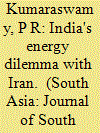

|
|
|
|
|
| Publication |
2013.
|
| Summary/Abstract |
Iran, being a major player in the hydrocarbon sector, is both an opportunity and a challenge for India. While Iran's hydrocarbons could partly address India's growing appetite for oil and natural gas and contribute to its energy security, its willingness to transform its energy ties with Iran beyond purely commercial transactions coincided with its desire to negotiate a civil nuclear deal with the US. Moreover some of the energy deals between the two countries are stuck over price disputes and technology difficulties, while others have come under international pressure and scrutiny. While international sanctions against Iran undermine India's ability to pursue its energy ties with Iran, maintaining the status quo has some economic and political advantages. Hence, India is not yet ready to abandon Iran for the US.
|
|
|
|
|
|
|
|
|
|
|
|
|
|
|
|
| 15 |
ID:
126805
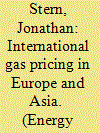

|
|
|
|
|
| Publication |
2014.
|
| Summary/Abstract |
In Continental Europe and LNG importing Asia, international gas prices reflect the market fundamentals of the 1970s-1990s when gas was replacing oil products and crude oil in energy balances. By the end of the 2000s, fundamentals in both these regions had changed significantly, but gas price formation mechanisms had not. This created major problems for buyers locked into long term contracts indexed to crude oil and oil product prices, which had risen to levels far above gas market fundamentals. By 2013, the transition to hub-based pricing was well advanced in Europe and dominant in the large markets in the north west of the Continent. In Asia the "crisis of fundamentals" was only just starting to be addressed with a transition to market pricing an urgent imperative, but still a distant prospect.
|
|
|
|
|
|
|
|
|
|
|
|
|
|
|
|
| 16 |
ID:
166952
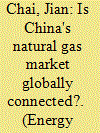

|
|
|
|
|
| Summary/Abstract |
The rise of the shale gas industry and the need for clean, low-carbon energy transformation in China has meant that the relationship between domestic and foreign natural gas markets has become closer. Therefore, identifying the changing relationships between the major global natural gas markets and China's natural gas market has important practical value for the current Chinese domestic natural gas pricing system. This paper used the DCC-GARCH-NARDL-ARDL-ECM as the analytical framework to study these relationships, from which it was found that there was no unified global natural gas market and that China's natural gas market was not yet aligned with this market. It was shown that there was no significant asymmetry in the impact of international gas prices on China's gas prices as no flexible adjustment measures were found in China's imported natural gas pricing mechanism. Moreover, while international natural gas prices were found to have a significant impact on China's natural gas prices over the long term, there were obvious regional differences over the short term. Accordingly, new pricing policies should be designed to promote market-oriented natural gas pricing reforms in acknowledging features such as asymmetry, the difference between imported gas sources and the periodicity of price adjustment.
|
|
|
|
|
|
|
|
|
|
|
|
|
|
|
|
| 17 |
ID:
138570
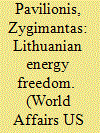

|
|
|
|
|
| Summary/Abstract |
During fifty years of illegal and often brutal occupation, the Soviet Union designed an energy infrastructure for Lithuania that made it totally dependent upon Russia for oil and natural gas. After the re-establishment of independence in 1990, we moved from suffering under the status quo to accepting the need for change, and finally to making steady progress toward energy independence.
|
|
|
|
|
|
|
|
|
|
|
|
|
|
|
|
| 18 |
ID:
125741
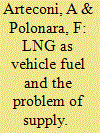

|
|
|
|
|
| Publication |
2013.
|
| Summary/Abstract |
The transport sector represents a major item on the global balance of greenhouse gas (GHG) emissions. Natural gas is considered the alternative fuel that, in the short-medium term, can best substitute conventional fuels in order to reduce their environmental impact, because it is readily available at a competitive price, using technologies already in widespread use. It can be used as compressed gas (CNG) or in the liquid phase (LNG), being the former more suitable for light vehicles, while the latter for heavy duty vehicles. The purpose of this paper is to outline the potential of LNG as vehicle fuel, showing positive and negative aspects related to its introduction and comparing the different supply options with reference to the Italian scenario, paying particular attention to the possibility of on site liquefaction. The analysis has highlighted that purchasing LNG at the regasification terminal is convenient up to a terminal distance of 2000 km from the refuelling station. The liquefaction on site, instead, asks for liquefaction efficiency higher than 70% and low natural gas price and, as liquefaction technology, the let-down plants at the pressure reduction points along the pipeline are the best option to compete with direct supply at the terminal.
|
|
|
|
|
|
|
|
|
|
|
|
|
|
|
|
| 19 |
ID:
166573
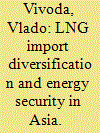

|
|
|
|
|
| Summary/Abstract |
Asia's share of global demand for natural gas has increased from 12 to 21 per cent since the turn of the century, and the overall consumption has more than doubled. At the same time, there is a widening gap between regional natural gas demand and supply, with increasing reliance on imports. In 2017, Asian importers absorbed 72 per cent of globally traded liquefied natural gas (LNG). Their LNG import dependence is forecast to grow significantly over the coming decades. This paper explores major Asian importers' approaches to LNG import diversification between 2001 and 2017 and explains why patterns of LNG imports differ across countries and over time. The focus of the paper is on five largest LNG importers in the region: China, India, Japan, South Korea and Taiwan. The paper utilises the Herfindahl-Hirschmann index (HHI) of market concentration to evaluate LNG import diversification across the five countries. The analysis contributes to a growing body of literature that evaluates various aspects of energy import diversification in the context of broader energy security strategies. Findings suggest that all countries have improved their LNG import portfolios, although there is significant temporal variation across countries. Reflecting on the relationship between energy security and growth, the paper concludes by outlining policy implications for regional energy policymakers.
|
|
|
|
|
|
|
|
|
|
|
|
|
|
|
|
| 20 |
ID:
112896


|
|
|
|
|
| Publication |
2012.
|
| Summary/Abstract |
Turkey was among those countries which decided to increase its natural gas consumption in the 1990s, due to its relative low cost and lack of impact on the environment. However, a heavy dependence on imports, from Algeria, Qatar and Nigeria, respectively, creates a threat to energy security, both in terms of source and supply diversity. Accordingly, we follow an analytical approach to identify the accuracy of our assumption, considering the current economic, political and security risk. To this end, we formulate and solve a mixed integer programming model that determines the optimal sourcing strategy for Turkey's increasing LNG demand. This model demonstrates a number of alternative policy options for LNG supply. Furthermore, we consider that increasing the proportion of LNG in the overall gas supply will contribute to the aim of improving Turkey's level of energy security.
|
|
|
|
|
|
|
|
|
|
|
|
|
|
|
|
|
|
|
|
|